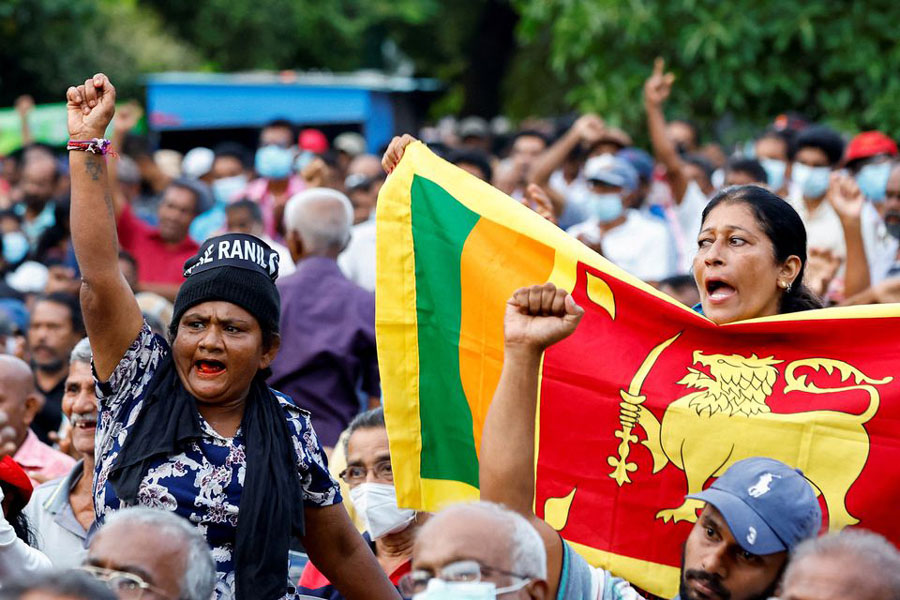Sri Lanka : IMF prescribes fighting inflation with anti-corruption

Published :
Updated :

Six months back many thought this would not be possible but Sri Lanka has reported that its inflation has dropped to single digit this July to 6.3 per cent. This has happened for the first time in two years. It's not just about the desperately needed economic relief to the people who have experienced the worst economic crisis in their history. It's also about the huge international pressures that Sri Lanka has been exposed to now.
The Census and Statistics Office of Sri Lanka said, "The overall rate of inflation as measured by the Colombo Consumer Price Index on a year-on-year basis is 6.3 per cent in July 2023. This was down from the 12 per cent recorded in June."
Single-digit inflation-5.8 - was reported the last time in September 2021. The highest inflation rate was 69.8 per cent as reported in September 2022.
The woes of the Sri Lankan economy are well known but things have begun to get better with the IMF lending a helping hand. However, it comes with conditions and one of them is active anti-corruption measures by the government. A bill to that end has been passed by the parliament and a full "Governance Diagnostic Report" is on as sought by the IMF.
ANTI-CORRUPTION AND IMF
The anti-corruption bill, aimed at improving governance in the crisis-hit country, is directly linked to a $2.9bn bailout from the International Monetary Fund (IMF). The bill was placed and passed without any amendment though several were proposed.
Sri Lanka's economy made global headlines for the wrong reasons when it collapsed due to several factors including inept financial management, crashes in exports earning and tourism, and failure to pay both internal and external debts. It was Sri Lanka's worst scenario in more than 70 years.
Things are looking better after a $2.9bn programme with the IMF was signed last March. This included introducing new anti-corruption legislation to strengthen governance and bring it in line with the United Nations Convention Against Corruption. It's the first time an IMF programme has been linked to such a measure in Asia.
"The Anti-Corruption Bill increases the powers and resources allocated to Sri Lanka's Commission to Investigate Allegations of Bribery or Corruption, which is mandated with carrying out major investigations. It can now conduct joint investigations with local and international counterparts."
IMF has said that its assistance must help the Sri Lankan people directly, hence the push for a governance diagnosis before taking measures to improve the same. IMF expects to assess corruption and vulnerabilities and "provide prioritized and sequenced recommendations". The Governance Diagnostic Report is expected to be published in September.
"We look forward to further engagement and collaboration with stakeholders and civil society organizations on this critical reform area," IMF officials said.
The IMF in recent years has done such governance diagnostic exercises in Moldova, the Republic of Congo, Mauritania and Zambia. The IMF has said that such reports push/ help recipient donor countries to adopt strong and effective policies. Basically, it's aimed against crony economics and allows greater market measures.
However political implications remain. Pushed by the IMF, Sri Lanka has sold several State Owned Enterprises (SOE)s that are profitable as "the state should not be involved in business." This has already caused trade unions to protest and military forces were deployed to end industrial action. Others, including Amnesty International, have said that implementing IMF reforms often causes HR violations. TIB has cautiously welcomed it stating that much depends on actions taken based on the report.
EXTREME PROBLEMS REMAIN BUT …
Sri Lanka's total debt is over $83bn, of which $41.5bn is foreign and $42.1bn is domestic. Restructuring is on but this isn't looking easy. The then President Gotabaya Rajapaksa fled the country in the face of massive street protests which were later revealed to be carried out mostly by groups close to the Chinese. The Indo-Chinese conflict continues in Sri Lanka ranging from verbal duels over military ship docking rights, conflict over major Indian investments and strategic positions in the Indian Ocean particularly relating to ports, docks and other facilities.
However, the economy has shown signs of improvement since Ranil Wickremesinghe took over as the President. Shortages have declined, power cuts have ended and the rupee has begun to strengthen.
The big lesson from the IMF's Sri Lanka plan is that future countries which seek loans will have to consider the political risks involved in taking such loans because many of the said countries allow large scale corruption which holds ruling power groups together. IMF loan conditionalities may force such governments to take steps which are not very friendly to the political governance structures that exist in many of the financial crisis hit countries.
It would seem that by insisting on good governance as a loan pre-condition may have a greater impact on lessening corruption and ensuring better state management governance than all other efforts. The belly always speaks.


 For all latest news, follow The Financial Express Google News channel.
For all latest news, follow The Financial Express Google News channel.